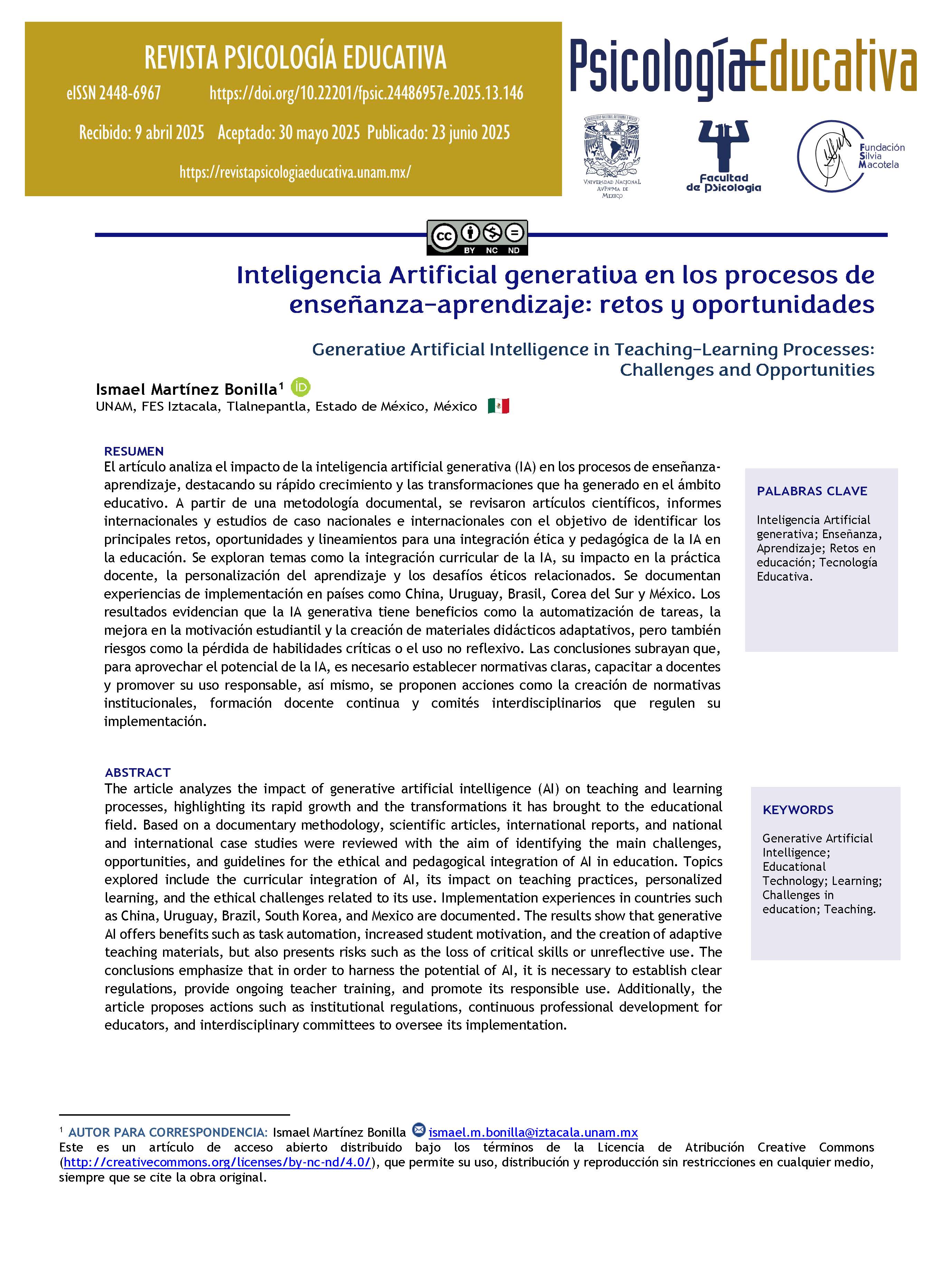Abstract
The article analyzes the impact of generative artificial intelligence (AI) on teaching and learning processes, highlighting its rapid growth and the transformations it has brought to the educational field. Based on a documentary methodology, scientific articles, international reports, and national and international case studies were reviewed with the aim of identifying the main challenges, opportunities, and guidelines for the ethical and pedagogical integration of AI in education. Topics explored include the curricular integration of AI, its impact on teaching practices, personalized learning, and the ethical challenges related to its use. Implementation experiences in countries such as China, Uruguay, Brazil, South Korea, and Mexico are documented. The results show that generative AI offers benefits such as task automation, increased student motivation, and the creation of adaptive teaching materials, but also presents risks such as the loss of critical skills or unreflective use. The conclusions emphasize that in order to harness the potential of AI, it is necessary to establish clear regulations, provide ongoing teacher training, and promote its responsible use. Additionally, the article proposes actions such as institutional regulations, continuous professional development for educators, and interdisciplinary committees to oversee its implementation.
References
Álvarez-Sepúlveda, H. (2023). La Inteligencia Artificial como Catalizador en la Enseñanza de la Historia: Retos y Posibilidades Pedagógicas. Revista Tecnológica-Educativa Docentes 2.0, 16(2), 318-325. https://doi.org/10.37843/rted.v16i2.426
Baker, T., y Smith, L. (2019). Educ-AI-tion rebooted? Exploring the future of artificial intelligence in schools and colleges. Retrieved from Nesta Foundation. https://media.nesta.org.uk/documents/Future_of_AI_and_education_v5_WEB.pdf
Bolaño-García M., y Duarte-Acosta N. (2024). Una revisión sistemática del uso de la inteligencia artificial en la educación. Rev Colomb Cir, 39(51): 63-83. https://doi.org/10.30944/20117582.2365
García, F. (2023). La percepción de la inteligencia artificial en contextos educativos tras el lanzamiento de ChatGPT: Disrupción o pánico. Education in the Knowledge Society, 1,(24): 1-9. https://doi.org/10.14201/eks.31279
Giannini, S. (2023). La inteligencia artificial generativa en la educación: Documento de reflexión. UNESCO. https://www.unesco.org/es/articles/la-inteligencia-artificial-generativa-en-la-educacion-documento-de-reflexion-de-sra-stefania
Lagos Reinoso, G., Garcés Suárez, E., y Alcívar Fajardo, O. (2025). Inteligencia artificial y pensamiento crítico: retos y oportunidades en la educación superior ecuatoriana. Journal of Science and Research, 9(1), 5-30. https://revistas.utb.edu.ec/index.php/sr/article/view/3480
Modi, A. (2021). Una introducción rápida a la inteligencia artificial (IA) y sus componentes. A quick introduction to Artificial Intelligence (AI) and its components. [Mensaje en Blog]. Recuperado de https://n9.cl/caehw
Olite, F., Suárez, I., y Vidal, M. (2023). Chat GPT: Origen, evolución, retos e impactos en la educación. Educación Médica Superior, 37(2), 1-23. https://ems.sld.cu/index.php/ems
Rentería García, C. D. (2024). El impacto de la Inteligencia Artificial en la Educación Superior: representaciones sociales y transformación institucional. TIES, Revista De Tecnología E Innovación En Educación Superior, 1(11), 53–71. https://doi.org/10.22201/dgtic.26832968e.2024.11.47
Terrazas Razo, O. (2023). ChatGPT y los retos de la educación media superior a distancia en México. Revista Mexicana De Bachillerato a Distancia, 15(29), 1-4. https://doi.org/10.22201/cuaieed.20074751e.2023.29.84989
Vera, F. (2023). Integración de la Inteligencia Artificial en la Educación superior: Desafíos y oportunidades. Transformar, 4(1), 17–34. https://www.revistatransformar.cl/index.php/transformar/article/view/84
Welham, D. (2008). AI in training (1980–2000): Foundation for the future or misplaced optimism? British Journal of Educational Technology, 39(2), 287–303. https://doi.org/10.1111/j.1467-8535.2008.00818.x.
Zawacki-Richter, O., Marín, V.I., Bond, M. et al. (2019). Systematic review of research on artificial intelligence applications in higher education – where are the educators?. Int J Educ Technol High Educ 16(39), 75-90. https://doi.org/10.1186/s41239-019-0171-0

This work is licensed under a Creative Commons Attribution-NonCommercial-NoDerivatives 4.0 International License.
Copyright (c) 2025 Universidad Nacional Autónoma de México


